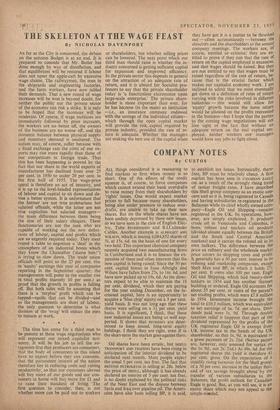COMPANY' NOTES
By C
USTOS
ALL things considered it is reassuring to find markets so firm when money is so short. One of the effects of the credit squeeze is, of course, to force companies which cannot extend their bank overdrafts to raise money from their shareholders by `rights' issues. One would expect market prices to fall because• many shareholders, being also under pressure to reduce over- drafts, are unable to take up their new shares. But on the whole shares have not been unduly depressed by these new issues, as we have seen in the case of English Elec- tric, Tube Investments and B.1.Callender Cables. Another example is ALBRIGIIT AND WILSON, which is issuing 6,084,852 shares of 5s. at 15s. 6d. on the basis of one for every two held. This important chemical company recently acquired two manufacturing firms in Cumberland and it is to finance the ex- pansion of these and other interests that the new capital is being raised. Since the 50 per cent. capital bonus in June Albright and Wilson have fallen from 27s. to 16s. 6d. and have now picked up to 19s, 6d. As the direc- tors expect to be able to maintain the 18 per cent. dividend, which they are paying for the year ending December, on the in- creased capital, here is an opportunity to acquire a `blue chip' equity on a 5 per cent. yield basis. It was not long ago that these shares were selling on a 31 per cent, yield basis. It is significant, I think, that these new industrial issues are being so well sup- ported. It shows that investors are deter- mined to keep sound, long-term equity holdings. I think they are right, even if in the short-term the market goes against them.
Oil shares have been erratic, but SHELL TRANSPORT AND TRADING have been rising in anticipation of the interim dividend to be declared next month. Most people expect the usual 5 per cent. tax free. The fact that BRITISH PETROLEUM is selling at 28s. below the price of SHELL, although it has already declared an interim of 5 per cent. tax free, is no doubt explained by the political risks of the Near East and the dispute between Syria and Iraq over pipeline oil. The Ameri- cans have also been selling BP, it is said,
to establish tax losses. Intrinsically, there- fore, BP must be relatively cheap. A firm
market has been seen in CANADIAN EAGLE
olL as a result of the strongly rising trend of tanker freight rates. I have described this Shell group company as an exotic con- cern and so it is, being registered in Canada and having subsidiaries re-registered in the
Bahamas while its chief wholly owned com- pany—Eagle Oil and Shipping—remains registered in the UK. Its operations, how- ever, are simply explained. It produces crude oil in Venezuela and Colombia, it buys, refines and markets oil products (divided almost equally between the British and the South and Central American markets) and it carries the refined oil in its own tankers. The difference between the price ex refinery and the wholesale market price covers' its shipping costs and profit. It generally has a 50 per cent. interest in its refining and marketing companies, except Shell Mex and BP, in which it holds 274 per cent. It owns also 100 per cent. Eagle Oil and Shipping, which had twenty-three tankers in 1954 and has another thirteen building or ordered. Eagle Oil accounts for about 35 per cent. or more of the parent's net trading profits, which were £7.8 million in 1954. Investment income brought the total to £10.3 million, which was equivalent to net earnings of 6s. 7d. per share. Divi- dends paid were Is. 9d. Through double taxation relief it happens that part of the dividend represented by the profits of the UK registered Eagle Oil is exempt from UK income tax in the hands of the UK shareholder, so that Is. 9d. is equivalent to a gross payment of 2s. 21d. (Surtax payers are, however, only assessed for surtax on the Is. 9d.; not 2s. 20.) At 49s. 6d. for the registered shares the yield is therefore 4t per cent. gross. On the expectation of a steadily rising turnover for the Shell group, of a 50 per cent. increase in the tanker fleet, and of tax savings brought about'by the transfer of various subsidiaries to the Bahamas, the profit outlook for Canadian Eagle is good. But, as you will see, it is an exotic share which may not appeal to the simple-minded.


























































 Previous page
Previous page